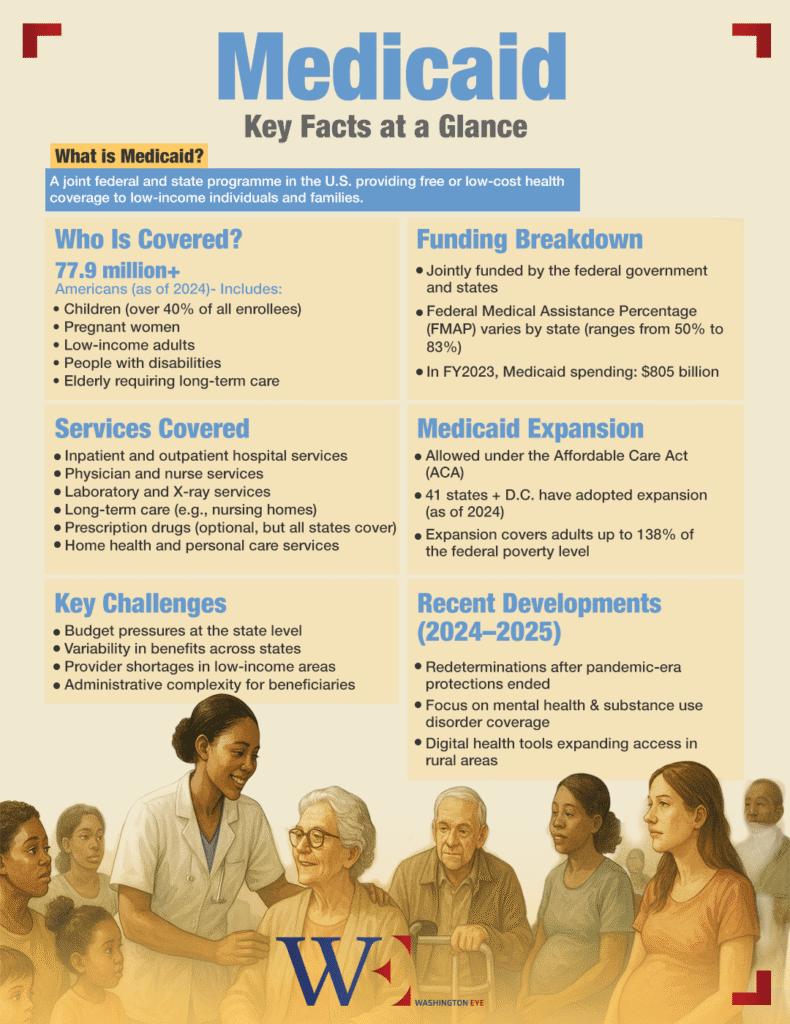At a recent town hall in Parkersburg, Iowa, Senator Joni Ernst faced backlash after responding to concerns about proposed Medicaid cuts with the remark, “Well, we all are going to die”. This comment, made during discussions about the “One Big Beautiful Bill”—a $700 billion spending and tax package—sparked criticism from constituents and political opponents alike. The Congressional Budget Office estimates that this legislation could lead to 8.6 million people losing Medicaid coverage over the next decade.
Ernst later posted a sarcastic apology video from a graveyard, which further fueled the controversy. Critics argue that her remarks and the proposed cuts reflect a broader indifference to the needs of vulnerable populations.
The Scope of Proposed Cuts: Medicaid and Beyond
The “One Big Beautiful Bill” aims to implement significant reductions in social welfare programs, including Medicaid and the Supplemental Nutrition Assistance Program (SNAP). Analysts warn that these cuts could result in approximately 15 million Americans losing health care coverage. The legislation also proposes work requirements and tighter eligibility criteria, which could disproportionately affect low-income individuals and families, according to Politico.
In Texas, for instance, rural communities that heavily rely on Medicaid and SNAP are at risk. Proposed federal cuts could lead to nearly 300,000 residents losing Medicaid coverage, endangering rural hospitals and increasing pressure on food banks.
A Comparative Lens: U.S. Welfare Spending vs. OECD Nations
When compared to other OECD countries, the United States allocates a smaller percentage of its GDP to public social spending. In 2024, the U.S. spent approximately 19% of its GDP on public social programs, whereas countries like France and Finland allocated over 30%. This disparity highlights differing national priorities regarding social welfare and safety nets.
The Nordic model, exemplified by countries such as Denmark and Sweden, emphasizes comprehensive welfare systems funded through higher taxation. These nations prioritize universal healthcare, education, and robust social safety nets, contributing to higher overall well-being and lower income inequality.
Implications and Consequences: Unpacking the Human and Economic Cost
The implications of welfare retrenchment in the United States extend far beyond budget spreadsheets. Cuts to programs like Medicaid and SNAP risk exacerbating social inequalities, destabilizing public health infrastructure, and intensifying economic precarity for millions of Americans.
From a healthcare standpoint, Medicaid is more than a line item—it is a lifeline. The program covers nearly 1 in 4 Americans, including low-income families, elderly people in nursing homes, and individuals with disabilities. According to the Kaiser Family Foundation, over 60% of nursing home residents are covered by Medicaid. Curtailing this funding could lead to mass discharges from care facilities, especially in rural and low-income areas, where private options are limited or unaffordable.
Rural hospitals in particular could face catastrophic consequences. A report from the Chartis Center for Rural Health shows that more than 600 rural hospitals are at risk of closure nationwide, many of which rely heavily on Medicaid reimbursements. When Medicaid enrollment drops, so does the financial viability of these hospitals. This could result in healthcare deserts where emergency services are no longer accessible within a critical window of time, increasing preventable deaths and long-term health complications.
SNAP cuts would carry equally profound consequences. For millions of working-class families, SNAP benefits are the difference between a full pantry and food insecurity. The U.S. Department of Agriculture estimates that every $1 in SNAP benefits generates about $1.50 in economic activity. Cutting these funds would not only reduce food access for households but also contract local economies, particularly in rural and low-income urban areas where SNAP usage is most prevalent.
Beyond immediate material impacts, these cuts risk accelerating long-term structural disadvantages. Children who grow up in food-insecure households or without access to basic healthcare services tend to perform worse in school, suffer higher rates of chronic illness, and experience lower economic mobility as adults. By undermining the welfare infrastructure now, policymakers may be planting the seeds for larger fiscal and public health crises in the future.
Social unrest and democratic legitimacy are also at stake. Surveys from the Pew Research Center show that public support for maintaining or expanding welfare programs remains high, even among moderate voters. Should lawmakers continue to push austerity measures that are seen as ideologically motivated rather than evidence-based, the result may be heightened political polarization and eroded trust in democratic institutions.
In sum, while the stated aim of proposals like the “One Big Beautiful Bill” is to restore fiscal balance, the downstream effects of deep cuts to Medicaid and SNAP may in fact burden the system in new and more intractable ways—financially, institutionally, and socially.
A Final Note: Navigating the Balance Between Fiscal Policy and Social Welfare
The debate over welfare cuts in the United States underscores the ongoing tension between fiscal conservatism and the provision of social safety nets. While proponents argue for the necessity of reducing government spending, critics highlight the potential human cost of such measures. As the U.S. continues to grapple with these issues, comparisons with other OECD countries offer valuable insights into alternative approaches to social welfare and the prioritization of public well-being.
















